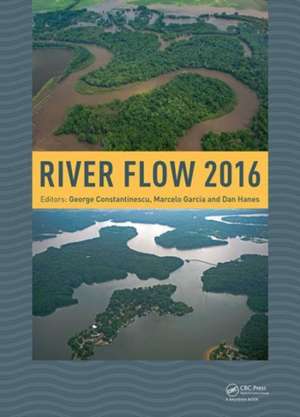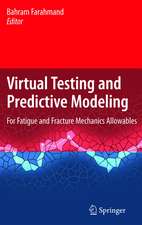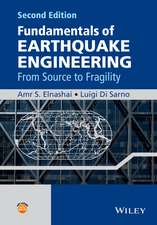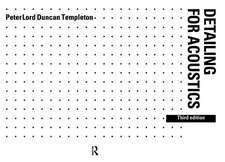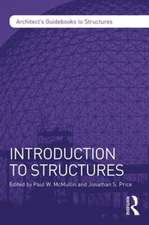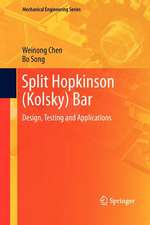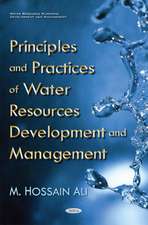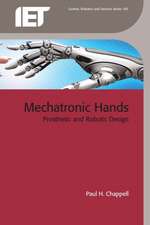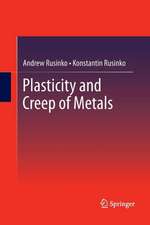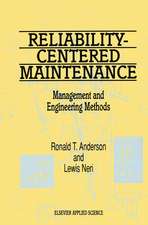River Flow 2016: Iowa City, USA, July 11-14, 2016
Editat de George Constantinescu, Marcelo Garcia, Dan Hanesen Limba Engleză Hardback – 24 iun 2016
Understanding and being able to predict fluvial processes is one of the biggest challenges for hydraulics and environmental engineers, hydrologists and other scientists interested in preserving and restoring the diverse functions of rivers. The interactions among flow, turbulence, vegetation, macroinvertebrates and other organisms, as well as the transport and retention of particulate matter, have important consequences on the ecological health of rivers. Managing rivers in an ecologically friendly way is a major component of sustainable engineering design, maintenance and restoration of ecological habitats. To address these challenges, a major focus of River Flow 2016 was to highlight the latest advances in experimental, computational and theoretical approaches that can be used to deepen our understanding and capacity to predict flow and the associated fluid-driven ecological processes, anthropogenic influences, sediment transport and morphodynamic processes.
River Flow 2016 was organized under the auspices of the Committee for Fluvial Hydraulics of the International Association for Hydro-Environment Engineering and Research (IAHR). Since its first edition in 2002, the River Flow conference series has become the main international event focusing on river hydrodynamics, sediment transport, river engineering and restoration. Some of the highlights of the 8th International Conference on Fluvial Hydraulics were to focus on inter-disciplinary research involving, among others, ecological and biological aspects relevant to river flows and processes and to emphasize broader themes dealing with river sustainability. River Flow 2016 (extended abstract book 854 pages + full paper CD-ROM 2436 pages) contains the contributions presented during the regular sessions covering the main conference themes and the special sessions focusing on specific hot topics of river flow research, and will be of interest to academics interested in hydraulics, hydrology and environmental engineering.
Preț: 2259.43 lei
Preț vechi: 3224.68 lei
-30% Nou
432.36€ • 462.32$ • 360.48£
Carte tipărită la comandă
Livrare economică 17 aprilie-01 mai
Specificații
ISBN-10: 1138029130
Pagini: 856
Dimensiuni: 174 x 246 mm
Greutate: 1.56 kg
Ediția:1
Editura: CRC Press
Colecția CRC Press
Public țintă
Postgraduate and ProfessionalCuprins
A. River flow and transport processes
A1.Laboratory and eddy-resolving numerical investigations of fundamental physical processes and transport in open channels
A2. Field studies and numerical investigations of flow and transport in natural streams
A3. Innovative field and laboratory instrumentation for the study of flow in open channels
Special session: Experimental techniques used in fluvial hydraulics. Organizer: C. di Cristo, University of Lazio, Italy
Special session: Image-based measurements and video analysis. Organizer: Y. Ozeren, University of Mississippi, USA
Special Session: Estimation of uncertainty in hydrometric measurements and other flow measurements of environmental scale. Organizer: J. Gonzalez, South Florida Water Management District, USA
Special session: Environmental role of hydraulic interfaces. Organizers: A. Marion, University of Padua, Italy; F. Ballio, Politechnic University Milan, Italy; J. Aberle, NTNU-Norwegian University of Science and Technology, Norway & M. Zaramella, University of Padova, Italy
Special session: Buoyancy-driven flows. Organizers: C. Adduce, University of Rome Tre, Italy & M. Franca, EPFL, Switzerland
B. Sediment transport and river morphodynamics
B1. Mechanics of sediment transport
B2. Dynamics of bedforms and meandering streams
B3. Large-scale river morphology and morphodynamics
B4. Local scour around hydraulic structures
B5. Numerical aspects of sediment transport and hyper-concentrated/granular flows
Special session: Reservoir sustainability. Organizer: A. Cox, Saint Louis University, USA
Special session: Applications of hydro-acoustics to river morphodynamics. Organizers: D. Hanes, Saint Louis University, USA & S. Wright, USGS, USA
Special session: Hydrodynamics and morphodynamics of river confluences. Organizer: B. Rhoads, University of Illinois at Urbana-Champaign, USA
Special session: Dynamics of meander cutoffs. Organizer: K. Konsoer, Louisianan State University, USA
C. River Floods
C1. Numerical prediction of floods
C2. Channel-floodplain interactions driven by floods
C3. Geomorphic dam-break flows and breach formation
C4. Flood propagation and control
Special session: Flood science for flood prediction, mitigation, and resilience. Organizers: M. Muste, L. Weber & N. Young, IIHR-Hydroscience and Engineering, University of Iowa, USA
D. River management, ecology, and restoration
D1. Sustainable engineering solutions for management of natural streams
D2. River training and design of river restoration structures
D3.Ecological aspects of river flows
D4. Flow in vegetated channels
Special session: Large wood in fluvial ecosystems. Organizer: V. Ruiz-Villanueva, University of Bern, Switzerland
Special session: Fish passage. Organizer: M. Politano, University of Iowa, USA
Descriere
Understanding and being able to predict fluvial processes is one of the biggest challenges for hydraulics and environmental engineers, hydrologists and other scientists interested in preserving and restoring the diverse functions of rivers. The interactions among flow, turbulence, vegetation, macroinvertebrates and other organisms, as well as the transport and retention of particulate matter, have important consequences on the ecological health of rivers. Managing rivers in an ecologically friendly way is a major component of sustainable engineering design, maintenance and restoration of ecological habitats. To address these challenges, a major focus of River Flow 2016 was to highlight the latest advances in experimental, computational and theoretical approaches that can be used to deepen our understanding and capacity to predict flow and the associated fluid-driven ecological processes, anthropogenic influences, sediment transport and morphodynamic processes.
River Flow 2016 was organized under the auspices of the Committee for Fluvial Hydraulics of the International Association for Hydro-Environment Engineering and Research (IAHR). Since its first edition in 2002, the River Flow conference series has become the main international event focusing on river hydrodynamics, sediment transport, river engineering and restoration. Some of the highlights of the 8th International Conference on Fluvial Hydraulics were to focus on inter-disciplinary research involving, among others, ecological and biological aspects relevant to river flows and processes and to emphasize broader themes dealing with river sustainability. River Flow 2016 (extended abstract book 854 pages + full paper CD-ROM 2436 pages) contains the contributions presented during the regular sessions covering the main conference themes and the special sessions focusing on specific hot topics of river flow research, and will be of interest to academics interested in hydraulics, hydrology and environmental engineering.
